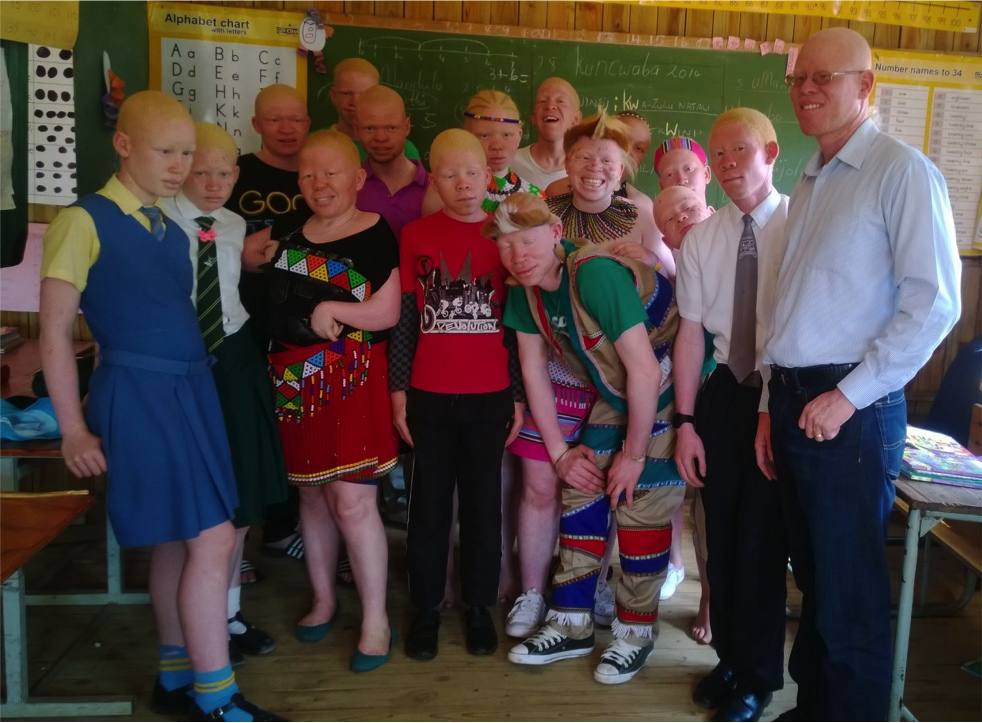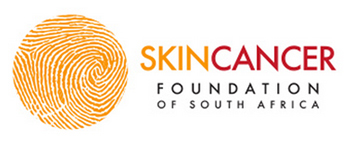Albinism Facts
What is Albinism?
People with albinism have little or no melanin pigment in their skin, eyes and hair. Melanin is important as it creates colour in these areas and protects them against the damaging sunrays. It manifests with very fair skin, light-coloured or white hair and eyes that are extremely sensitive to the sun.
Who is at risk of Albinism?
Albinism occurs throughout the world, in all races, and in both males and females. It is more common in Africa and Japan.

How do you get Albinism?
It is an inherited condition. It is usually recessively inherited. This means two albinism genes, one from each parent, are inherited for the condition to be present. Most often, the parents will have normal skin colour, as they are only carriers of the albinism gene. A carrier means they have one albinism gene and one normal gene; the one normal gene is enough to produce colour in the skin, hair and eyes. Couples who are each carriers of the albinism gene have a one in four chance of having a child with albinism with each pregnancy. For couples where the man and woman both have albinism, all the children will have albinism.
What are the concerns in people with albinism?
The body is unable to produce melanin pigment. This affects the skin, eyes, and hair.
The Skin
Melanin absorbs ultraviolet (UV) light in the skin so it does not get sun-damaged. Patients are at an increased risk of sun damage and skin cancer. Sun damage will make them look much older than their age.
The Eyes
Melanin is also important in the development of the eye. Patients have impaired vision and sensitivity of the eyes to the sun. They may also have abnormal eye movements (squint).
The Hair
The hair may appear white or light, but this does not cause any health problems.
Less commonly patients may have problems of the immune system, blood clotting or hearing disturbances. People with albinism develop normally and have normal intelligence just like other people.
How should people with albinism take care of themselves?
Sun protection
– Avoid sun exposure during peak sunlight intensity periods (9am to 3pm)
– Wear protective clothing
- broad-brimmed sun hats
- shirts with collars
- long sleeves
– Use sunscreen on all sun-exposed areas
- Broad spectrum sunscreen against UVA and UVB
- At least SPF 30
- Re-apply every 2 hours when out in the sun
Skin Exams
– Patients must visit their doctors regularly for a skin examination (every 6m).
– Patients should promptly report suspicious spots or growths on the skin.
Eye Care
– Patients must be seen by an eye doctor. They will be able to provide them with glasses that may improve, but not cure, their visual disturbances.
– Wear sunglasses when exposed to sun
Albinism and Skin Cancer
Albinos are at increased risk for skin cancer. The main types of skin cancers that affect albinos are basal cell carcinoma and squamous cell carcinoma. It is important to catch these skin cancers early before the invade deep into the skin. It is unlikely that they will spread inside the body, but it is possible if they are very advanced and aggressive. Melanoma is a more serious type of skin cancer and is rare in patients with albinism.
Signs that a lesion may be a skin cancer:
- changing
- growing
- painful or sore
- itchy
- bleeding
- will not heal
Any concerning skin lesions should be brought to the attention of your general doctor or a skin doctor!
Albinism Myths
- It is not true that if people with albinism are killed and used for traditional medicine (Muthi) it will make people rich.
- It is not true the people with albinism disappear when there is lightening.
- We should not call people with albinism “inkawu” as this term is hurting to them. We must remember that they also have feelings like anyone of us.
- We should not ostracise them or look down upon them. They are human beings and are capable of achieving great things in life like all of us.
Brought to you by:

ASSA Goals
- To enhance the self esteem of people with albinism
- To provide education about albinism for those with and without albinism
- To dispel myths about albinism
- To promote access to resources for patients with albinism
Why should someone with albinism register with ASSA?
- Join a safe and supportive community for people with albinism
- Learn about local support groups and events about albinism
- Become a leader for education about albinism and human rights
Resources
Albinism Society of South Africa-KZN (ASSA-KZN)
Website: www.albinism.org.za
Local Contact: Bhekisisa Maxwell Thabethe
Email: assakzn@gmail.com
Cell: 0845554994
NPO 009E389
Mailing Address: P.O. 2466 Durban 4000
Dermatology Department, Nelson Mandela School of Medicine, University of KwaZulu-Natal
Website: dermatology.ukzn.ac.za
Department of Dermatology,
Room 327, 3rd Floor
Nelson R Mandela School of Medicine
719 Umbilo Road
Congella, Durban 4013
Tel: + 27 31 3603546/ 2604531
Fax: + 27 31 3603549/ 2604531 NN
